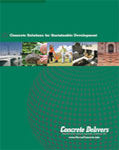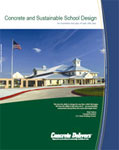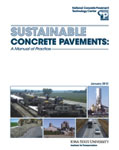Concrete's Contribution to Sustainable Development
Reports, Studies, Fact Sheets, Reference Guides and Other Resources in Support of Sustainable Development
Most items are FREE! Choose from the topics below:
Sustainability | Pervious Concrete | Parking Lots | Concrete Buildings | Continuing Education

Architects, engineers, developers and owners are seeking efficient and innovative building solutions that conserve non-renewable resources. As sustainability becomes increasingly important, so does the necessity of keeping up with the rapid advancement of building materials and construction practices. The following technical and informational resources for concrete are available to support sustainable development goals. Many are available for free or for a nominal cost.
Make sure your work is enhanced with these valuable and up-to date-materials.
To order printed material, contact Jacques Jenkins by email at jjenkins@nrmca.org.

Concrete Solutions for Sustainable Development
(4-page brochure in pdf for owners & engineers) From NRMCA's Concrete Delivers Series.
(Click here to purchase)

Concrete and Sustainable School Design
(4-page brochure in pdf for owners & engineers) From NRMCA's Concrete Delivers Series.
(Click here to purchase)

Sustainable Concrete Pavements: A Manual of Practice
This manual, developed by the Concrete Pavement Research and Technology Center (CP Tech Center) at Iowa State University provides detailed information on sustainability concepts for concrete pavements. The intended audience includes decision makers and practitioners in both owner-agencies and supply, manufacturing, consulting, and contractor businesses. Readers will find individual chapters with the most recent technical information and best practices related to concrete pavement design, materials, construction, use/operations, renewal, and recycling. In addition, they will find chapters addressing issues specific to pavement sustainability in the urban environment and to the evaluation of pavement sustainability.
(Click here to download)
Functional Resilience: Prerequisite for Green Buildings
The enhanced functional resilience of a building’s structure should be the first consideration of a green building.
 Protecting Lives and Property: Making Green Buildings “Functionally Resilient”
Protecting Lives and Property: Making Green Buildings “Functionally Resilient”
Functional Resilience—A building’s capacity to provide viable operations through extended service life, adaptive re-use and the challenges of natural and man-made disasters. Free PDF
 Ready Mixed Concrete Industry’s LEED Reference Guide
Ready Mixed Concrete Industry’s LEED Reference Guide
Updated 3rd edition with LEED 2009 information
Developed by the U.S. Green Building Council, the LEED® (Leadership in Energy and Environmental Design) program is designed to promote the construction of high-performance, sustainable buildings.
Much new public construction, and more and more private sector construction, is now required to be LEED® Certified.
This guide will educate specifiers about the energy saving and pro-environmental benefits of concrete and how it may fit into projects that are to be LEED® Certified.
 Concrete CO2 Fact Sheet
Concrete CO2 Fact Sheet
This publication provides an overview of the complexities of climate change and the greenhouse effect and summarizes the concrete industry’s efforts to minimize environmental impact related to carbon dioxide emissions. Free PDF
 New Technology-Based Approach to Advance Higher Volume Fly Ash Concrete with Acceptable Performance
New Technology-Based Approach to Advance Higher Volume Fly Ash Concrete with Acceptable Performance
This document reports on a important study co-funded by the U.S. Department of Energy's Combustion Byproducts Recycling Consortium and recently conducted at NRMCA's Lab.
Free PDF

Model Ordinance to Adopt Sustainable Building Standards
Green or sustainable buildings use key resources like energy, water and land more efficiently than buildings that are just built to code. They also tend to create healthier work, learning and living environments, with more natural light and better air quality, and typically contribute to improved employee and student health, comfort and productivity. This model is designed to be used by regulatory officials and municipalities interested in supporting sustainable building. Free PDF

Crushed Concrete as Aggregate for New Concrete
This document reports on a study recently conducted at NRMCA's Lab and details how the proper use of crushed returned concrete can save the construction industry $300 million annually in materials and disposal costs.
(From Concrete InFocus magazine)

Concrete Information for Sustainable Design
Pervious Concrete Topics
When It Rains It Drains.pdf |
Model Stormwater Pervious Pavement Ordinance.pdf |
Hydraulic Performance of Pervious Pavement for Stormwater Management.pdf |
Portland Cement Pervious Concrete Performance Investagation.pdf |
Construction and Maintenance of Pervious Concrete.pdf |
Pervious Concrete Maintenance Guidelines.pdf
Heat Island Mitigation/Reflectance/Lighting Topics
Concrete Pavements and Urban Heat Island Effect.pdf |
Influence of Pavement Reflectance on Lighting for Parking Lots.pdf |
Comparative Heat Balance in Pervious and Impervious Concrete Pavement.pdf (New 2010)
Environmental Topics
Environmental Impacts of Portland Cement Concrete and Asphalt Pavements.pdf |
Concrete and CO2.pdf Climate Change and Concrete.pdf
LEED® and Concrete Topics
LEED® 2009 Reference Guide.pdf |
Concrete’s Contribution to LEED® 2009.pdf
Additional Information
NRMCA Sustainable Development Resources.pdf
Project Profiles
Foxwood Center, Orange Park, FL.pdf |
Prime Retail Outlet, Williamsburg, VA.pdf |
Shoreview, MN Street Replacement.pdf |
Shoreview, MN Street Replacement Update 2010.pdf |
Make it Right, New Orleans, LA.pdf
 top
top
 Pervious Concrete Pavements (w/PCA)
Pervious Concrete Pavements (w/PCA)
This introduction to pervious concrete pavements reviews its applications and engineering properties, including environmental benefits, structural properties and durability. Both hydraulic and structural designs of pervious concrete pavements are discussed, as well as construction techniques. Content included at www.PerviousPavement.org. Book: $17
 Portland Cement Pervious Pavement Field Performance Investigation on Parking Lot and Roadway Pavements
Portland Cement Pervious Pavement Field Performance Investigation on Parking Lot and Roadway Pavements
This report, funded by the RMC Research & Education Foundation and prepared at Cleveland State University, demonstrates the successful use of pervious concrete in freeze-thaw environments, with little maintenance required.
 Model Stormwater/Pervious Pavement Ordinance
Model Stormwater/Pervious Pavement Ordinance
This model ordinance was developed in consultation with numerous stakeholders, including concrete industry members, civil engineers, environmental advocates and consultants in the field of stormwater management. The model offers local governments a starting point for the development of a stormwater ordinance that includes pervious pavement systems. Free PDF
 Construction and Maintenance Assessment of Pervious Concrete Pavements
Construction and Maintenance Assessment of Pervious Concrete Pavements
This report, prepared by the Stormwater Management Academy at the University of Central Florida, details construction and maintenance issues to ensure maximum performance of pervious concrete.
 Hydraulic Performance Assessment of Pervious Concrete Pavements for Stormwater Management Credit
Hydraulic Performance Assessment of Pervious Concrete Pavements for Stormwater Management Credit
This report, prepared by the Stormwater Management Academy at the University of Central Florida, focuses on the stormwater management properties of pervious concrete.
 When It Rains, It Drains
When It Rains, It Drains
Pervious concrete as a paving material has generated tremendous interest due to its ability to allow water to flow through itself to recharge groundwater and minimize stormwater runoff. This brochure provides an overview of how pervious concrete helps address these important stormwater management issues, and includes a helpful FAQ section.
Free PDF. Call or e-mail for free hard copies.
Pervious Concrete Research Compilation
Funded by the RMC Research & Education Foundation, this document compiles reports on significant pervious concrete research projects. It includes abstracts. Free PDF
 top
top
Concrete Delivers Brochure—for Owners
This brochure describes the economic, environmental and aesthetic advantages of concrete parking. It supports the interests of owners and architects with photos and informative text.
Concrete Delivers Brochure—for Designers/Specifiers
This brochure is designed to provide architects and engineers with important information about parking areas. It is a condensed summary of engineering best practices for concrete parking areas, including very useful illustrations and tabular data. Call or e-mail for free hard copies.
Concrete Pavement Analyst Software
NRMCA's Concrete Pavement Analyst (CPA) - Version 3, is a powerful concrete parking area design and costing comparison tool that quickly and accurately quantifies the differences between concrete and asphalt pavements. Using ACI and Asphalt Institute recommendations, CPA compares total ownership costs, providing specifiers the information they need to make sound pavement decisions. The Reference Library includes PCA’s Comparison of Six Environmental Impacts of Portland Cement Concrete and Asphalt Cement Concrete Pavements and Influence of Pavement Reflectance on Lighting for Parking Lots.
Call or email for a free CD.
 top
top
Insulating Concrete Form (ICF) Brochure
This brochure is designed to inform commercial building owners, lenders, engineers, specifiers and others about the many economic and green benefits of ICF technology. The brochure outlines ICFs’ many advantages, with helpful illustrations and appealing photos of projects. Call or e-mail for free hard copies.
NRMCA’s Continuing Education Series (CES) has been designed to provide valuable, current and authoritative information on important subjects for architectural, engineering and construction professionals. Course offerings are available on the web and at scheduled seminars throughout the U.S.
CLICK HERE for more information.
Current offerings include:



![]() Building Green with Concrete
Building Green with Concrete
![]() Design of Concrete Parking Lots
Design of Concrete Parking Lots
![]() Environmental Benefits of Concrete
Environmental Benefits of Concrete
![]() Pervious Concrete—A Stormwater Solution
Pervious Concrete—A Stormwater Solution
![]() Storm-Resistant Concrete Homes and Buildings
Storm-Resistant Concrete Homes and Buildings




